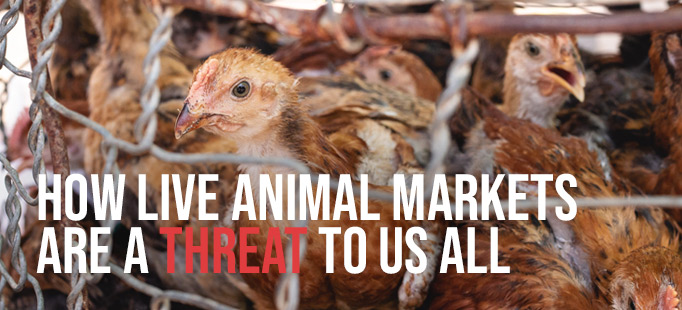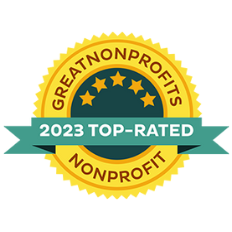CLICK HERE TO SIGN OUR CHANGE.ORG PETITION
The Animal Trade Practices that Set Off a Pandemic
With COVID-19 ravaging populations of the world, people are desperate to understand what caused the outbreak so we might collectively prevent it from happening again. The leading theory is that the novel coronavirus first crossed over to humans from wild animals being killed and sold at a live animal market in Wuhan, China. These markets are often called "wet" markets and refer to any kind of market selling fresh animal meat and other perishable goods. The “wet” part of the name refers to the melting ice used to preserve the animal flesh and the repeated rinsing of floors to clear away blood and other contaminants. In many of these markets –including those in Wuhan– live animals are frequently kept in cages and/or tanks and killed for the customer upon purchase.
The concern with these kinds of markets is that live animals are often kept alongside a wide variety of species in cruel conditions that keep them weak and vulnerable to illnesses. This allows viruses and bacteria to evolve and spread between species and eventually infect humans. These animal-borne illnesses are known as Zoonotic diseases, and the CDC claims “3 out of every 4 new or emerging diseases in [humans] come from animals.” In response to the coronavirus outbreak and immense public pressure, China has taken steps to stop dangerous wild animal consumption, but where does that leave wet markets? There is confusion between the two, but it’s worth understanding that either can live independently of the other, and that these aren’t just a problem with China.
China’s Ban on Wildlife Consumption
China took the important step to ban terrestrial wildlife trade and consumption as a result of the outbreak. This ban was originally temporary and was strictly enforced, with over 700 arrests within the first two weeks of February 2020.
On February 24th, 2020, the Standing Committee of the National People’s Congress moved to make this a permanent ban by amending China’s Wildlife Protection Law. Though the ban is a step forward in the continued effort to protect wildlife and avoid new disease outbreaks, there is still a significant risk that enforcement may not be effective enough to prevent underground sales. Much of this trade was already criminalized and continued happening illegally, unabated by law enforcement.
The new amendment to the Wildlife Protection Law also makes exemptions for “scientific research, medical use, display, etc that require non-edible use of wild animals”. In a February 26th analysis, the Wildlife Conservation Society claimed these loopholes allow traffickers to "exploit the non-food exemptions to sell or trade live wildlife, creating additional challenges to law enforcement". In an even more egregious contradiction, on March 4th, the Chinese National Health Commission promoted bear bile as a COVID-19 treatment, despite no proven effect on coronaviruses.
Status of Live Markets
Live markets were closed as part of the coronavirus lockdown, but according to a Daily Mail correspondent, they have reopened in parts of China as early as March 27th 2020 and appear to be operating in much the same way as they had previously been. It is unclear whether law enforcement will be strictly enforcing the new ban on wildlife sales in these markets, but whether selling “wild” animals or traditionally domesticated animals, there is an inherent risk to the live animal market format, and indeed the farming and consumption of animals in general.
The decision to reopen wet markets in China has been met with criticism from U.S. leaders and congress. On April 3rd, 2020, U.S. White House coronavirus task force member, Dr. Anthony Fauci, condemned the practice on the Cable program, Fox & Friends, saying, “It boggles my mind how, when we have so many diseases that emanate out of that unusual human-animal interface, that we just don't shut it down”. In a bipartisan letter guided by Sen. Cory Booker (D-N.J.) and Sen. Lindsey Graha,m (R-S.C.), 66 members of the U.S. Congress urged the World Health Organization (WHO), World Organization for Animal Health (OIE), and the United Nations (UN) to ask member states to immediately ban the dangerous wet markets.
Though it is true that wet markets in China are a demonstrable risk for the development and spread of incredibly deadly pathogens, and are likely the cause of the global Coronavirus pandemic, the full story is a bit more nuanced.
A Larger Problem
“Wet markets”, though not always referred to as such, are not unique to Asia. Live animal markets are a global concern and have long operated in countries around the world. Counts from 2015 indicated that at least 80 live poultry markets were in operation in New York City alone, and they were likely still butchering live animals until the city’s devastating COVID-19 outbreak made it the North American epicenter of the disease.
On Feb 10th, 2020, more than 200 organizations and individuals issued an open letter to the WHO, UN, and OIE, urging global action to close live wildlife markets and wildlife trade, noting also the practice’s major contribution to the global decline in wildlife and biodiversity. Live animal markets, wherever they are in the world, contain stressed, sick animals caged in close proximity, in a practice that offers the ideal breeding ground for deadly pathogens. Intolerably cruel conditions aside, these markets present a global health risk of which we’re starting to see the consequences.
As long as these markets are operating, we are at risk for another, possibly worse, pandemic. Please take action and sign our petition to urge the World Health Organization, the World Organization for Animal Health and the United Nations to protect our most vulnerable and call for an international ban on live animal markets.












